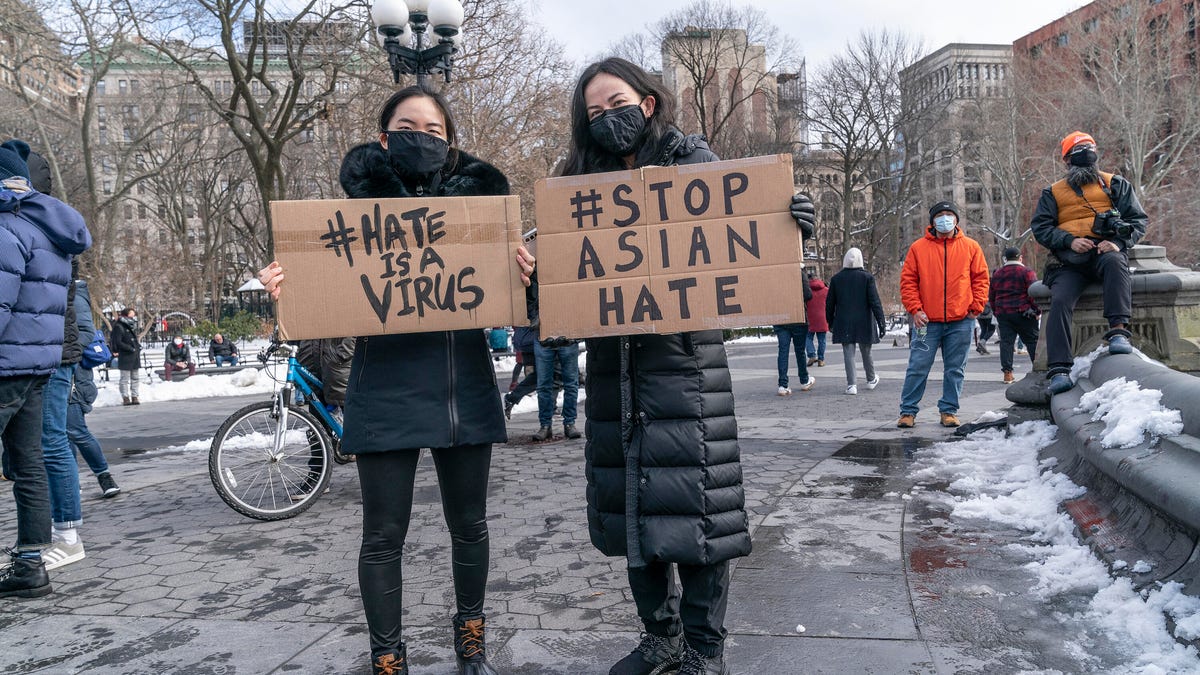The 'Chinese virus' label has led to violence and death. It needs to stop
Commentary: We're seeing the results of what happens when loaded terms subtly -- or not so subtly -- link the Asian American community to the coronavirus.

The shootings in Atlanta have brought the issue of anti-Asian violence into the spotlight. But many of us have been living with this anxiety for a year.
Around a year ago, I wrote about the dangers of the term "Chinese virus." A term espoused by former President Donald Trump and repeated ad nauseam on social media as a loaded alternative to coronavirus . I argued the phrase wasn't only divisive in a moment when we needed unity but would lead to further violence against the Asian American and Pacific Islander communities.
While I expected the usual trolls to come out and tell me to "stick to tech," I was still shocked by the flood of comments thrashing my commentary, with some offering up their own, more offensive take on the term. Others told me to stop trying to impose my political views on the matter. Most refused to recognize the loaded racial implications of those words and the risks they carry. The reactions to my YouTube video were particularly heinous.
From March 2020 through 2021, nonprofit Stop AAPI Hate tallied more than 10,900 incidents of racism against Asian Americans. That was capped off in mid-March by the tragic killing of eight people -- six of them Asian American women -- in shootings in Atlanta that outraged the nation and brought the issue of violence against Asian Americans to the forefront.
"I told you so," has never been so heartbreaking.
So I'm writing once again to remind people that words matter.
It's the kind of simple grade school concept that shouldn't be controversial. But even as I tweeted it out in the aftermath of the shooting in March, someone responded and asked me to stop making this political and blaming Republicans (ignoring the fact that I never mentioned Republicans, or any group for that matter). Ultimately, this isn't political. Those words have let people of all background pin their blame, anger and frustration on the AAPI community.
See also: How to help the Asian American community: Donations, educational resources, more
It's not just me. President Joe Biden echoed this sentiment in his speech in Atlanta.
"Words have consequences," he said. "It's the coronavirus. Full stop."
It's a statement backed up by hard science. A study conducted by UC San Francisco found that more than half of the tweets including the hashtag #chinesevirus also used an anti-Asian hashtag. Only a fifth of the tweets that included the #covid19 hashtag showed anti-Asian sentiment. The study had looked at the tweets from a week before to a week after Trump tweeted the words "Chinese virus" on March 16, 2020.
"Our data provide new empirical evidence supporting recommendations to use the less-stigmatizing term 'COVID-19,' instead of 'Chinese virus,'" the study said.
The US Centers for Disease Control and Prevention and the World Health Organization already have policies in place to avoid linking viruses with geography and creating unnecessary stigma -- policies Trump frequently flouted.
While the shootings in Atlanta last month have turned this into a national issue, the dangers to my family and friends have been real for the past 12 months. Linking the coronavirus to Asian Americans has put a bull's-eye on our backs. Even before those shootings, my feed was filled with reports of senseless assaults on Asian American senior citizens -- some with tragic consequences. More than a year ago, my son's classmate and his mother were verbally assaulted by a passerby in a car.
Still think those words don't matter? I spent part of the following weekend on Amazon shopping for personal defense equipment for my parents, whose age sadly makes them prime targets for attacks. I worry about my friends in New York, where the number of incidents have exploded. Just days after the shooting, an Asian woman was punched in the face repeatedly in front of her daughter on her way to a protest against anti-Asian violence.
This is not normal. But it's all too common for the Asian American community, which has been stuck with this reality and silently screaming all this time. And it all started with those two little words.
I initially didn't want to write this commentary. Frankly, I'm emotionally drained. I struggled to find the right words. But I'm well aware of the stereotype of the quiet "model minority" Asian, and I know silently screaming accomplishes nothing.
Anne Chow, CEO of AT&T Business, said during a Daily Charge podcast interview that it will require continued conversation to sustain a movement that continues to shed light on this problem. But this needs to be a movement, and not a flash-in-the-pan moment of outrage that is quickly forgotten.
Because I'm not OK with this. I'm angry and frustrated. You should be, too.

